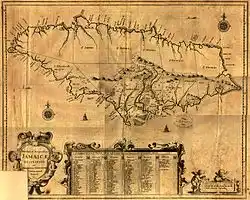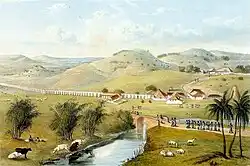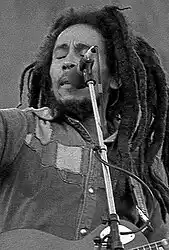
Jamaican surnames are the surnames held by people living on the island of Jamaica in the Caribbean, as well as the Jamaican diaspora which has strong offshoots in the United Kingdom, the United States, Canada and some other Caribbean countries like the Cayman Islands. Jamaican surnames have a very similar history and structure to African American surnames in that they broadly a mix of English, Scottish and Welsh surnames. This is because the slave population of Jamaica gradually adopted British surnames of one kind or another in the eighteenth and nineteenth centuries as slavery came to an end. Many slaves adopted the surnames of their former owners or individuals who had manumitted them, while in a more benign strain some adopted the surname of a benefactor of some kind.[1]
History of Jamaican surnamesHistory of Jamaican surnames
Modern Jamaican surnames are almost entirely the product of the colonial history of the island and the institution of slavery there. In pre-Columbian times Jamaica was inhabited by various peoples, most notably groups of Taino people, the broad group which along with the Caribs inhabited much of the Caribbean islands when the Spanish arrived in the 1490s. Thereafter disease devastated the native population of the island. As elsewhere in the Caribbean the Spanish soon began bringing in slaves from West Africa to replace the native people as forced laborers. However, the Spanish themselves were eventually forced out of Jamaica when it was conquered by the English from Spain as part of Oliver Cromwell’s Western Design to conquer parts of the Caribbean in the mid-1650s.[2]

Under English rule from the mid-seventeenth century onwards Jamaica developed first as a haven for English piratical activity in the Caribbean and then as one of the leading centers of sugar cane production in the West Indies. This led to the transport of a huge number of slaves to Jamaica to provide forced labor on the sugar cane plantations. The scale of this was immense. Some estimates hold that at least 600,000 slaves, or possibly significantly more, were brought to Jamaica between the advent of English rule in the 1650s and the mid-nineteenth century when both the slave trade and illegal smuggling of slaves onto the island tapered off. To put this in perspective, it is understood that around 388,000 slaves were brought into the Thirteen Colonies and the United States between 1619 and the mid-nineteenth century, meaning that the rate exceeded the US in Jamaica by at least 50%.[3]
While the first and second generations of slaves on Jamaica might have remembered their African heritage, over time this became diluted. Consequently, as slaves were manumitted and freed in the eighteenth and nineteenth centuries, and as slavery came to an official end in the 1830s following the British Slavery Abolition Act of 1833, many slaves adopted British surnames of one kind or another. Typically these were the surnames of former owners or benefactors of some kind. Owing to this process Jamaican surnames are effectively offshoots of English, Scottish and Welsh surnames, though borne for the most part by people of African ethnicity.[4]
Most popular Jamaican surnamesMost popular Jamaican surnames
The most popular Jamaican surnames tend to be:
- Brown – The most common surname in Jamaica, held by some 70,000 of the island’s 2.8 million people. It is a descriptor surname which emerged as a way of describing someone who had brown hair or a swarthy complexion many centuries ago.
- Williams – The second most common surname in Jamaica. It evolved in England centuries ago as a way of saying ‘son of William’ and is thus a patronymic surname that was transplanted to the Caribbean.
- Smith – The third most common surname in Jamaica, held by roughly 47,000 people, is an occupation surname which was applied to describe people centuries ago who worked as blacksmiths or metalworkers of some kind.
- Campbell – This Jamaican surname is Scottish in origin, though linguistically it comes from Irish/Gaelic. Cam in Irish means ‘crooked’ and beal means ‘mouth’, so Campbell means ‘crooked mouth’. As such, it is a descriptor surname. It became highly common in late medieval and early modern Scotland as the Clan Campbell became one of the most powerful lordly lineages in the Western Isles or Outer Hebrides.
- Johnson – The fifth most common Jamaican surname. It is a patronymic surname which, as one would expect, means ‘son of John’.[5]
Famous JamaicansFamous Jamaicans

- Bob Marley – Perhaps the most famous Jamaican of them all, Marley was a global icon in the 1970s. He popularized reggae music to an unprecedented extent. His surname is a rarefied one in Jamaica. The name is partly derived from ‘leah’, an Old English term for a ‘woodland clearing’.[6]
- Grace Jones – A singer, actress and model, Jones starred in a James Bond movie in between moving between various musical genres in the 1970s, 1980s and 1990s. Her surname is a relatively common one in Jamaica, effectively meaning ‘son of John’.[7]
- Portia Simpson-Miller – The first female Prime Minister of Jamaica, serving in that office from 2006 to 2007 and again from 2012 to 2016.[8]
- Usain Bolt – The fastest man in history, Bolt has won eight Olympic gold medals in sprint events and hold the world records for the fastest time in the 100 meter and 200 meter events. His surname is a relatively uncommon one. Only about 600 Jamaicans have the Bolt surname. It is ultimately derived from the Anglo-Saxon word for a ‘small farm’.[9]
See alsoSee also
Explore more about Jamaican surnamesExplore more about Jamaican surnames
- Jamaica Births and Baptisms, 1752-1920 record collection on MyHeritage
- Jamaica, Civil Registration, 1880-1999 record collection on MyHeritage
- Jamaica Church of England Parish Register Transcripts, 1664-1880 record collection on MyHeritage
References
- ↑ Trevor Burnard, ‘Slave Naming Patterns: Onomastics and the Taxonomy of Race in Eighteenth-Century Jamaica’, in The Journal of Interdisciplinary History, Vol. 31, No. 3 (Winter, 2001), pp. 325–346.
- ↑ Nicole Greenspan, ‘News and the Politics of Information in the Mid Seventeenth Century: the Western Design and the Conquest of Jamaica’, in History Workshop Journal, No. 69 (Spring, 2010), pp. 1–26.
- ↑ Herbert S. Klein, ‘The English Slave Trade to Jamaica, 1782–1808’, in The Economic History Review, New Series, Vol. 31, No. 1 (February, 1978), pp. 25–45.
- ↑ https://jis.gov.jm/information/stalwarts/
- ↑ https://forebears.io/jamaica/surnames
- ↑ https://www.biography.com/musicians/bob-marley
- ↑ https://www.harpersbazaar.com/celebrity/g44265780/grace-jones-career-in-photos/
- ↑ https://www.councilwomenworldleaders.org/portia-simpson-miller.html
- ↑ https://www.biography.com/athletes/a45897247/usain-bolt

